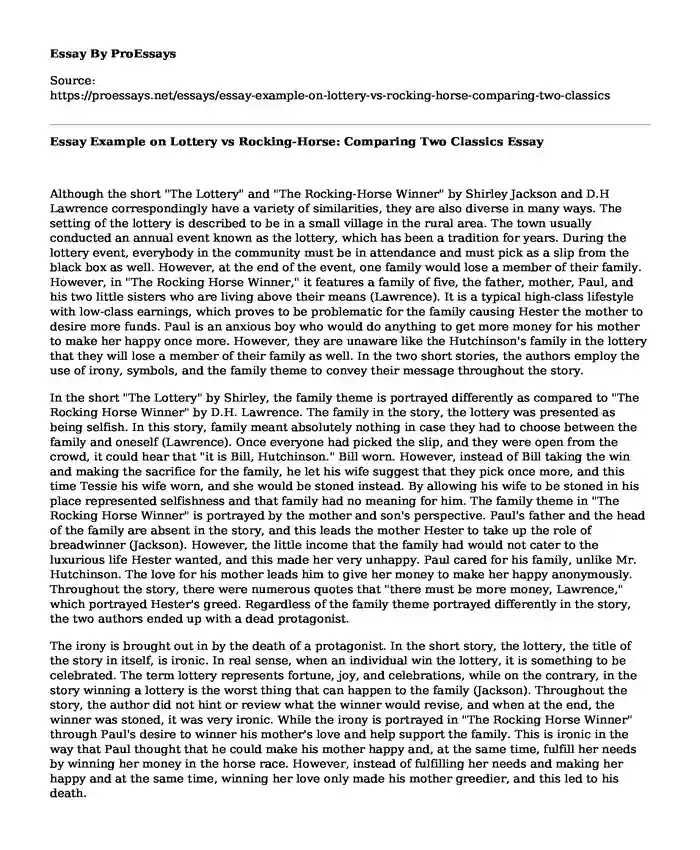Although the short "The Lottery" and "The Rocking-Horse Winner" by Shirley Jackson and D.H Lawrence correspondingly have a variety of similarities, they are also diverse in many ways. The setting of the lottery is described to be in a small village in the rural area. The town usually conducted an annual event known as the lottery, which has been a tradition for years. During the lottery event, everybody in the community must be in attendance and must pick as a slip from the black box as well. However, at the end of the event, one family would lose a member of their family. However, in "The Rocking Horse Winner," it features a family of five, the father, mother, Paul, and his two little sisters who are living above their means (Lawrence). It is a typical high-class lifestyle with low-class earnings, which proves to be problematic for the family causing Hester the mother to desire more funds. Paul is an anxious boy who would do anything to get more money for his mother to make her happy once more. However, they are unaware like the Hutchinson's family in the lottery that they will lose a member of their family as well. In the two short stories, the authors employ the use of irony, symbols, and the family theme to convey their message throughout the story.
In the short "The Lottery" by Shirley, the family theme is portrayed differently as compared to "The Rocking Horse Winner" by D.H. Lawrence. The family in the story, the lottery was presented as being selfish. In this story, family meant absolutely nothing in case they had to choose between the family and oneself (Lawrence). Once everyone had picked the slip, and they were open from the crowd, it could hear that "it is Bill, Hutchinson." Bill worn. However, instead of Bill taking the win and making the sacrifice for the family, he let his wife suggest that they pick once more, and this time Tessie his wife worn, and she would be stoned instead. By allowing his wife to be stoned in his place represented selfishness and that family had no meaning for him. The family theme in "The Rocking Horse Winner" is portrayed by the mother and son's perspective. Paul's father and the head of the family are absent in the story, and this leads the mother Hester to take up the role of breadwinner (Jackson). However, the little income that the family had would not cater to the luxurious life Hester wanted, and this made her very unhappy. Paul cared for his family, unlike Mr. Hutchinson. The love for his mother leads him to give her money to make her happy anonymously. Throughout the story, there were numerous quotes that "there must be more money, Lawrence," which portrayed Hester's greed. Regardless of the family theme portrayed differently in the story, the two authors ended up with a dead protagonist.
The irony is brought out in by the death of a protagonist. In the short story, the lottery, the title of the story in itself, is ironic. In real sense, when an individual win the lottery, it is something to be celebrated. The term lottery represents fortune, joy, and celebrations, while on the contrary, in the story winning a lottery is the worst thing that can happen to the family (Jackson). Throughout the story, the author did not hint or review what the winner would revise, and when at the end, the winner was stoned, it was very ironic. While the irony is portrayed in "The Rocking Horse Winner" through Paul's desire to winner his mother's love and help support the family. This is ironic in the way that Paul thought that he could make his mother happy and, at the same time, fulfill her needs by winning her money in the horse race. However, instead of fulfilling her needs and making her happy and at the same time, winning her love only made his mother greedier, and this led to his death.
In the end, both the authors ended their story with "the death of the winner." The use of irony and family theme was evident throughout each of the stories. In "The Lottery," the lesson was traditions are good, but some of the cultures can be deadly, and it is up to the reader to decide on whether to uphold some of the customs or try to change them. On the contrary, the message or the lesson that can be learned from "The Rocking Horse Winner" is that love cannot be bought with the material things. The two authors' works were similar in a way but also different at the same time.
Works Cited
Jackson, Shirley. "The lottery." Taharlev. Yhe Cool Collection: An Anthology for Today's Teenager. Israel: Eric Cohen Books (2001). Retrieved from http://web1.nbed.nb.ca/sites/ASD-S/1820/J%20Johnston/The_Lottery_with_questions_Shirley_Jackson.pdf
Lawrence, David Herbert. The rocking-horse winner. Dramatic Publishing, 1966. Retrieved from https://interestingliterature.com/2016/12/a-summary-and-analysis-of-d-h-lawrences-the-rocking-horse-winner/
Cite this page
Essay Example on Lottery vs Rocking-Horse: Comparing Two Classics. (2023, Apr 24). Retrieved from https://proessays.net/essays/essay-example-on-lottery-vs-rocking-horse-comparing-two-classics
If you are the original author of this essay and no longer wish to have it published on the ProEssays website, please click below to request its removal:
- Treatment Towards Protagonist of the Yellow Wallpaper Essay
- Eveline Story Essay Example
- The Valley of Bewilderment: Conference of the Birds Essay
- Chickamauga and Vigil Strange I Kept on the Field One Night Essay
- Essay on Charlotte Perkins Gilman's the Yellow Wallpaper
- Class in Evelina by Burney Essay Example
- Essay Example on Gods' Roles in Homer's The Odyssey: Exploring Odysseus' Journey Home







